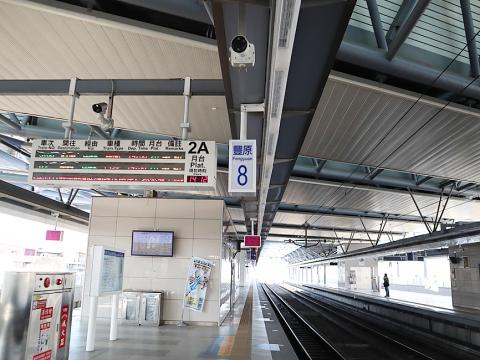The Taiwan Railways Administration (TRA) yesterday said that it would not activate the facial-recognition feature of its new smart surveillance system after lawmakers voiced their concerns over privacy issues.
The railway operator on Tuesday announced that it would soon start testing a smart surveillance system at Fengyuan Railway Station in Taichung.
The company said that the system would be mainly used to ensure the safety of passengers in and around railway stations — including detecting any intrusion onto the railway tracks and other restricted areas, abnormal loitering of individuals on the platforms or inside buildings, and suspicious packages — but lawmakers raised concerns that the facial-recognition technology would infringe on people’s privacy.

Photo: Ou Su-mei, Taipei Times
Chinese Nationalist Party (KMT) Legislator Ko Chih-en (柯志恩) said that the Democratic Progressive Party (DPP) administration has been critical of China for abusing human rights through the use of facial-recognition systems.
Ko asked if the administration of President Tsai Ing-wen (蔡英文) had learned from China by installing the technology to control the public.
DPP legislators sparked controversy in 2017 when they proposed a change to the Household Registration Act (戶籍法) that would legalize the use of iris-recognition systems by offices, Ko said.
The KMT caucus would have strongly opposed the use of facial-recognition technology if the TRA did not acceptably define the conditions under which the technology would be used, Ko said, adding that she was glad that it had decided not to activate the functionality.
KMT Legislator Jason Hsu (許毓仁) said that the Hollywood movie Enemy of the State shows how a government could control people through the mass collection of data and monitoring their whereabouts using surveillance devices.
“China has used surveillance devices to enforce a social credit rating system, while Hong Kong uses the devices to monitor pro-democracy protesters. Is it not strange that what DPP is planning to do is also what China is doing?” Hsu said.
Constitutional interpretations by the Council of Grand Justices have determined that the police cannot stop and frisk individuals without a legitimate reason, and that people have the right not to be monitored in public places, Hsu said.
However, the facial-recognition technology would enable the government to monitor people closely, like “watching goldfish in a transparent fish tank,” he said.
Following the criticism, the Taiwan Railways Administration said that it would not activate the facial-recognition technology, nor would the Railway Police Bureau.
“We will continue to build an environment that is friendly to all railway passengers while ensuring the safety of the transportation system,” the company said.

A magnitude 7.0 earthquake struck off Yilan at 11:05pm yesterday, the Central Weather Administration (CWA) said. The epicenter was located at sea, about 32.3km east of Yilan County Hall, at a depth of 72.8km, CWA data showed There were no immediate reports of damage. The intensity of the quake, which gauges the actual effect of a seismic event, measured 4 in Yilan County area on Taiwan’s seven-tier intensity scale, the data showed. It measured 4 in other parts of eastern, northern and central Taiwan as well as Tainan, and 3 in Kaohsiung and Pingtung County, and 2 in Lienchiang and Penghu counties and 1

FOREIGN INTERFERENCE: Beijing would likely intensify public opinion warfare in next year’s local elections to prevent Lai from getting re-elected, the ‘Yomiuri Shimbun’ said Internal documents from a Chinese artificial intelligence (AI) company indicated that China has been using the technology to intervene in foreign elections, including propaganda targeting Taiwan’s local elections next year and presidential elections in 2028, a Japanese newspaper reported yesterday. The Institute of National Security of Vanderbilt University obtained nearly 400 pages of documents from GoLaxy, a company with ties to the Chinese government, and found evidence that it had apparently deployed sophisticated, AI-driven propaganda campaigns in Hong Kong and Taiwan to shape public opinion, the Yomiuri Shimbun reported. GoLaxy provides insights, situation analysis and public opinion-shaping technology by conducting network surveillance

‘POLITICAL GAME’: DPP lawmakers said the motion would not meet the legislative threshold needed, and accused the KMT and the TPP of trivializing the Constitution The Legislative Yuan yesterday approved a motion to initiate impeachment proceedings against President William Lai (賴清德), saying he had undermined Taiwan’s constitutional order and democracy. The motion was approved 61-50 by lawmakers from the main opposition Chinese Nationalist Party (KMT) and the smaller Taiwan People’s Party (TPP), who together hold a legislative majority. Under the motion, a roll call vote for impeachment would be held on May 19 next year, after various hearings are held and Lai is given the chance to defend himself. The move came after Lai on Monday last week did not promulgate an amendment passed by the legislature that

AFTERMATH: The Taipei City Government said it received 39 minor incident reports including gas leaks, water leaks and outages, and a damaged traffic signal A magnitude 7.0 earthquake struck off Taiwan’s northeastern coast late on Saturday, producing only two major aftershocks as of yesterday noon, the Central Weather Administration (CWA) said. The limited aftershocks contrast with last year’s major earthquake in Hualien County, as Saturday’s earthquake occurred at a greater depth in a subduction zone. Saturday’s earthquake struck at 11:05pm, with its hypocenter about 32.3km east of Yilan County Hall, at a depth of 72.8km. Shaking was felt in 17 administrative regions north of Tainan and in eastern Taiwan, reaching intensity level 4 on Taiwan’s seven-tier seismic scale, the CWA said. In Hualien, the